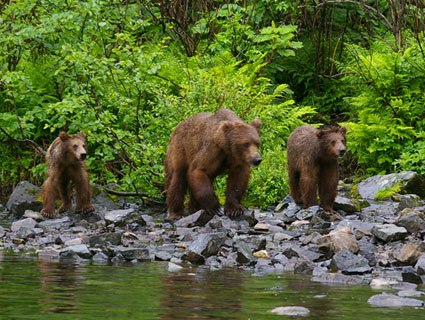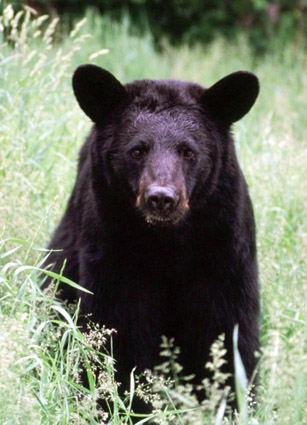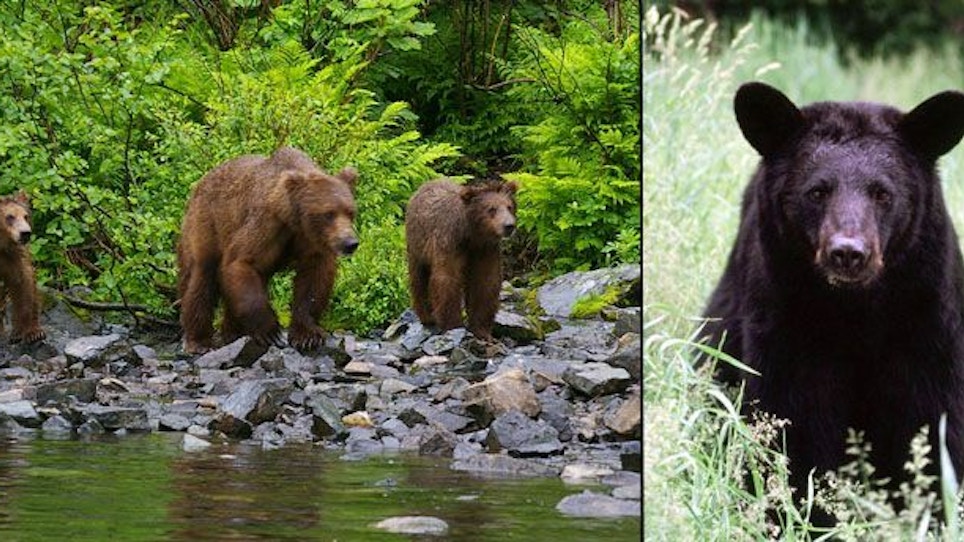 A bear that sees, smells or hears a human usually retreats unless it is a sow trying to protect her young. |
Bears are typically shy, solitary animals. Most prefer to avoid humans, and if they see, smell or hear a person, they usually retreat unless they are trying to protect their young.
Most encounters between bears and humans occur with the human unaware it even happened. Bears sometimes become bolder, however, if they are hungry or have become “habituated” to humans. Most commonly, habituation happens when bears learn to associate humans with food, often around campsites. Most problems can be avoided, however, by following a few precautions.
Smart campers store all foods, including dog food and horse feed, in closed, bear-resistant containers or suspended above the ground. A pulley system and rope in camp can be used to hang food and/or game out of reach at least 10 to 15 feet above the ground and 4 feet out from the supporting structure.
You also should keep sleeping bags, tents and sleeping areas free of food and beverage odors. And don’t sleep in clothes that were worn while handling game or cooking.
Keep a clean camp. After meals, wipe down tables and chairs. Wash dishes and utensils immediately and dispose of wastewater downwind, at least 100 feet from the sleeping area. Store all odorous items as food, including garbage, toothpaste, deodorant, lotions, creams and sprays, in bear-resistant containers.
When leaving camp, pack all food scraps and trash in sealed plastic bags and take them out for proper disposal. When these items are left behind or buried, they attract bears to campsites, increasing the chance of bad encounters either for campers.
Handling Game
For those fortunate enough to harvest a game animal in bear country, there are additional precautions to take.
• Wear gloves and an apron when dressing game to reduce odors on clothing.
• When gutting an animal, separate the carcass from the entrails. Then quickly remove the carcass from the area. The longer a carcass is left in the field, the greater the chance of a bear-human conflict. Don’t leave entrails within one mile of a trail, campsite, picnic area or parking lot.
• Don’t store game carcasses too close to camp or near a trail.
• Hang game so it can be seen from a distance. This allows hunters to observe it when returning. If a bear has claimed the food for itself, the bruin can be avoided. Surrender the carcass to a bear if he has already begun feeding on it.
• Knives and other tools used when dressing game should be washed thoroughly and stored with the game.
Bear Encounters
Even with an individual’s best efforts, it is still possible encounter a bear in camp. Usually the bear will detect the person first and leave the area. But if one meets a bear that doesn’t retreat, here are suggestions:
• If a bear is seen but has not seen the person, the person should calmly leave the area, detouring as far away as possible and making noise so the bear knows he is there.
• If a bear stands, it is trying to see, hear and smell the person better. Speak softly while backing away to a place of safety and avoiding direct eye contact. Watch what the bear does, and adjust actions accordingly.
 The best way to defend against a bear attack is bear pepper spray. Misplaced gun shots may just wound the animal, making it even more dangerous. |
• Don’t run or make sudden movements. Running may cause the bear to charge. Besides, humans cannot outrun bears, and bears can climb trees.
If a Bear Charges, Spray, Don’t Shoot
If a bear seems aggressive and won’t retreat, experts say the best defense is use of bear pepper spray. Everyone who camps or hunts in bear country should keep a full can where they can quickly get to it.
Unlike a gun, bear pepper spray does not have to be aimed precisely to stop a charging bear. The spray unit makes a fog in the air. When the spray hits the bear, it dilates the capillaries of the bear’s eyes and causes temporary blindness. It also makes the bear choke and cough.
When you buy pepper spray, be sure the container says the product is made for stopping or preventing bear attacks. Other types of personal defense sprays may not work.
Also, be sure the canister contains at least nine ounces of spray. Cans smaller than this may not last long enough or spray far enough to stop a bear’s charge.
Always carry the can in the field and in camp. Keep it in a hip pouch or chest holster where it can be quickly reached. In a tent, keep spray next to a flashlight. Read accompanying instructions and know how to properly use the spray.
Bad encounters with bruins are usually because the bear is acting defensively rather than aggressively. By understanding the behavior and needs of bears, hunters can avoid unpleasant encounters. And when the hunter sees a bear, it will be a good thrill, not a bad one.






